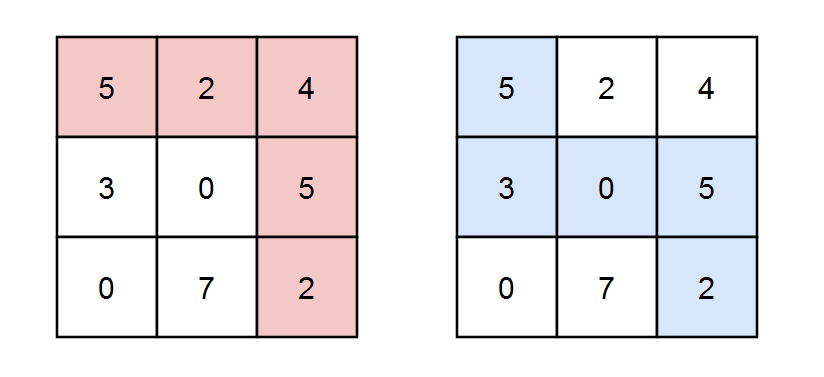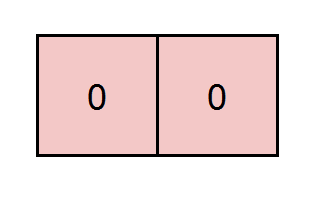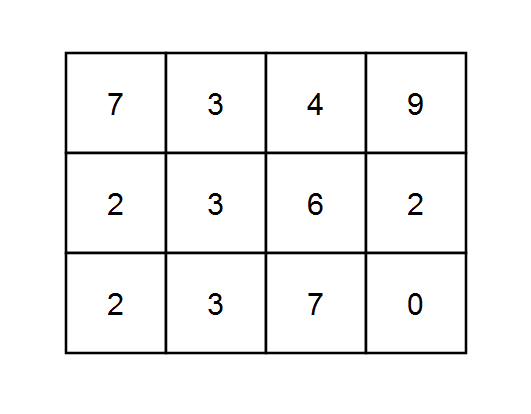Welcome to Subscribe On Youtube
Formatted question description: https://leetcode.ca/all/2435.html
2435. Paths in Matrix Whose Sum Is Divisible by K
- Difficulty: Hard.
- Related Topics: Array, Dynamic Programming, Matrix.
- Similar Questions: Unique Paths, Unique Paths II, Minimum Path Sum, Dungeon Game, Cherry Pickup, Shortest Path in Binary Matrix, Minimum Cost Homecoming of a Robot in a Grid.
Problem
You are given a 0-indexed m x n integer matrix grid and an integer k. You are currently at position (0, 0) and you want to reach position (m - 1, n - 1) moving only down or right.
Return** the number of paths where the sum of the elements on the path is divisible by k. Since the answer may be very large, return it **modulo 10^9 + 7.
Example 1:

Input: grid = [[5,2,4],[3,0,5],[0,7,2]], k = 3
Output: 2
Explanation: There are two paths where the sum of the elements on the path is divisible by k.
The first path highlighted in red has a sum of 5 + 2 + 4 + 5 + 2 = 18 which is divisible by 3.
The second path highlighted in blue has a sum of 5 + 3 + 0 + 5 + 2 = 15 which is divisible by 3.
Example 2:

Input: grid = [[0,0]], k = 5
Output: 1
Explanation: The path highlighted in red has a sum of 0 + 0 = 0 which is divisible by 5.
Example 3:

Input: grid = [[7,3,4,9],[2,3,6,2],[2,3,7,0]], k = 1
Output: 10
Explanation: Every integer is divisible by 1 so the sum of the elements on every possible path is divisible by k.
Constraints:
-
m == grid.length -
n == grid[i].length -
1 <= m, n <= 5 * 10^4 -
1 <= m * n <= 5 * 10^4 -
0 <= grid[i][j] <= 100 -
1 <= k <= 50
Solution (Java, C++, Python)
-
class Solution { private static final int MOD = (int) 1e9 + 7; public int numberOfPaths(int[][] grid, int k) { int m = grid.length, n = grid[0].length; int[][][] dp = new int[m][n][k]; dp[0][0][grid[0][0] % k] = 1; for (int i = 0; i < m; ++i) { for (int j = 0; j < n; ++j) { for (int s = 0; s < k; ++s) { int t = ((s - grid[i][j] % k) + k) % k; if (i > 0) { dp[i][j][s] += dp[i - 1][j][t]; } if (j > 0) { dp[i][j][s] += dp[i][j - 1][t]; } dp[i][j][s] %= MOD; } } } return dp[m - 1][n - 1][0]; } } -
class Solution { public: int numberOfPaths(vector<vector<int>>& grid, int k) { int m = grid.size(), n = grid[0].size(); int mod = 1e9 + 7; vector<vector<vector<int>>> f(m, vector<vector<int>>(n, vector<int>(k, -1))); function<int(int, int, int)> dfs; dfs = [&](int i, int j, int s) { if (i < 0 || i >= m || j < 0 || j >= n) return 0; s = (s + grid[i][j]) % k; if (i == m - 1 && j == n - 1) return s == 0 ? 1 : 0; if (f[i][j][s] != -1) return f[i][j][s]; int ans = dfs(i + 1, j, s) + dfs(i, j + 1, s); ans %= mod; f[i][j][s] = ans; return ans; }; return dfs(0, 0, 0); } }; -
class Solution: def numberOfPaths(self, grid: List[List[int]], k: int) -> int: m, n = len(grid), len(grid[0]) dp = [[[0] * k for _ in range(n)] for _ in range(m)] dp[0][0][grid[0][0] % k] = 1 mod = 10**9 + 7 for i in range(m): for j in range(n): for s in range(k): t = ((s - grid[i][j] % k) + k) % k if i: dp[i][j][s] += dp[i - 1][j][t] if j: dp[i][j][s] += dp[i][j - 1][t] dp[i][j][s] %= mod return dp[-1][-1][0] -
func numberOfPaths(grid [][]int, k int) int { m, n := len(grid), len(grid[0]) var mod int = 1e9 + 7 f := make([][][]int, m) for i := range f { f[i] = make([][]int, n) for j := range f[i] { f[i][j] = make([]int, k) for x := 0; x < k; x++ { f[i][j][x] = -1 } } } var dfs func(i, j, s int) int dfs = func(i, j, s int) int { if i < 0 || i >= m || j < 0 || j >= n { return 0 } s = (s + grid[i][j]) % k if i == m-1 && j == n-1 { if s == 0 { return 1 } return 0 } if f[i][j][s] != -1 { return f[i][j][s] } ans := dfs(i+1, j, s) + dfs(i, j+1, s) ans %= mod f[i][j][s] = ans return ans } return dfs(0, 0, 0) } -
function numberOfPaths(grid: number[][], k: number): number { const MOD = 10 ** 9 + 7; const m = grid.length, n = grid[0].length; let ans = Array.from({ length: m + 1 }, () => Array.from({ length: n + 1 }, () => new Array(k).fill(0)), ); ans[0][1][0] = 1; for (let i = 0; i < m; i++) { for (let j = 0; j < n; j++) { for (let v = 0; v < k; v++) { let key = (grid[i][j] + v) % k; ans[i + 1][j + 1][key] = (ans[i][j + 1][v] + ans[i + 1][j][v] + ans[i + 1][j + 1][key]) % MOD; } } } return ans[m][n][0]; }
Explain:
nope.
Complexity:
- Time complexity : O(n).
- Space complexity : O(n).